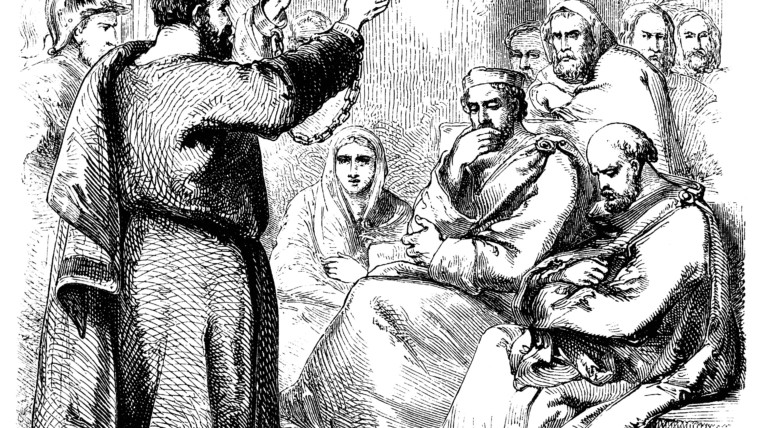Denmark’s Righteous Gentiles
by Christine Egbert
In its final and most virulent strain, Anti-Semitism is once again pandemic. It’s on the rise in Europe, in Asia, and in the United States. Most shockingly, it is on the rise on college campuses and in mainline Christian denominations. In twenty-first Century politically correct parlance this most ancient hatred for Israel and the Jewish people is now referred to as anti-Zionism. But I am not here to tell you how Islam is fanning the flames of anti-Semitism. Most readers are likely quite aware of this growing menace. So I will not waste time appalling you with all the atrocities being committed. Instead, I want to inspire you. That’s right–inspire you with some little-known history.
Anyone who’s watched Schindler’s List knows that the State of Israel honors Gentiles who risked their lives to save Jews during the Holocaust. They call them: ”khassidey umot ha’olam”–the righteous of the world’s nations. But what you may not know is that during World War II, one tiny occupied nation saved 7,200 of its 7,800 Jews over the month of October in 1943. What made the feat truly a miracle was its spontaneity.
That country was Denmark.
Their incredible, and little–known, history inspired me to write Miracle Across the Sound, available through Amazon and Kindle.
While Flem and Liesel’s love story is fiction, the greater love story—that of ordinary Danes for their fellow citizens—is pure history. Miracle Across the Sound dramatizes their fearless and selfless actions. Ordinary folks, from ambulance drivers to Lutheran pastors, courageous men like George F. Duckwitz, and even distinguished men like physicist Niles Bohr, gloriously stood up to evil and shouted, “No!” in October of 1943. Their awe-inspiring, yet unheard-of, history must be told. That is why I wrote Miracle Across the Sound.
But there is one other reason I wrote this novel. I want to start a new line of Christian Fiction, one with characters who understand that Jesus (Yeshua) did not come to start a new religion. While the bulk of this article will focus on the historical facts I wove into the fictional storyline, at the very end, I will include an excerpt of the scene in which Flem tells his father about his faith in Jesus (Yeshua).
In 1939, Germany signed a non-aggression pact with King Christian of Denmark, who foolishly failed to fortify the country’s border with Germany, not that it would have done much good. Then, in the wee hours of April 9, 1940, as German paratroopers rained from the sky, German soldiers docked at Langelinie Pier, and by 4 a.m., Hitler’s troops marched into Jutland.
As the Danish Army engaged in a brief skirmish, the Royal Guard defended Amalienborg Castle. Thirteen died. Twenty-three were wounded, and the Danish Navy did absolutely nothing.
Resistance would be suicidal. Denmark, unlike its mountainous neighbors, was flat. Fighters had nowhere to flee, nowhere to hide. So the King surrendered. But while Parliament entered into a policy of negotiation with their German occupiers, Denmark’s merchant seamen disobeyed orders. Instead of sailing to neutral ports, they joined the Allied Forces.
And thus began Denmark’s occupation. But the finish of a race is more important than its start. And to properly understand what happened three years later, during the fall of 1943, one must know some Danish history.
Denmark had no ghettoes.
As far back as 1690, while most of Europe was persecuting Jews, Denmark’s Parliament fired one of its police chiefs for merely suggesting Denmark do likewise. Only that wasn’t enough. The Danish Parliament, adamant about civil and religious freedoms, went one step further. They wrote a resolution condemning ghettoes as inhuman. And so, three years after the occupation, while Jews in other German-occupied lands were rotting in ghettoes, stripped of their humanity, or dying in concentration camps, stripped of their very lives, Denmark’s Jewish citizens were still free.
Civil and religious rights were a part of Danish history. It was in their blood. It defined who they were. One bold college student, right under the noses of the Gestapo, requested audience participation one afternoon at a song-fest in Gjorslev.
The crowd was asked to sing two national anthems. The first was Denmark’s own—no surprise there. The second one caused the Reich’s dignitaries to fall out of their seats. The students stood, and as the Zionist flag was unfurled, the students belted out the lyrics to Hatikvah.
In the international press, the Danes became known as Hitler’s pampered canary. But while the Danes insisted on civil rights, they complied with working hard on the farms and factories to provide for Hitler’s war machine–at least on the surface. Without fighters hiding out in non-existent mountains, Danes resisted the only way possible: with strikes and sabotage. Both were up in the summer of 1943, and Hitler was fit to be tied. He wanted Denmark’s Jews rounded up.
On August 29, 1943, Berlin demanded an end to all Danish resistance. They prohibited public gatherings, enacted a curfew, and censored the press. Firearms and explosives were to be surrendered before September 1st. Those found in possession of them, as well as all saboteurs, were to be executed. Harassment of Danes who were cooperating with the Germans would no longer be tolerated. Special tribunals to deal with infringements of the new laws were established, and the severest punishments were enacted.
The Danish Parliament resigned, refusing to meet Berlin’s demands. So Germany took over and enforced martial law.
Wanting to implement Hitler’s “Final Solution”, plans were made to round up Denmark’s Jews in a surprise raid to commence on Rosh Hashanah. Their plan might have worked had it not been for a German named Georg F. Duckwitz, who had been living in Copenhagen for several years, and was the head of German shipping.
George had heard about the raid first hand from Germany’s civilian administrator in Denmark, Dr. Werner Best, and had been agonizing for weeks about what he should do. George made his decision once the ships were in the harbor. He knew in just over twenty-four hours, on October 1st, the raid would begin.
He hurried over to where he knew the Social Democrats were meeting, and whispered into the ear of Hans Hedtoft, “The disaster is going to take place. All the details are planned. The Jews, your poor fellow citizens, are going to be deported to an unknown destination.”
Thus the miracle began. Hans Hedtoft immediately warned C.B. Henriques, the head of the Jewish Community, as well as Dr. Marcus Melchior, the acting chief Rabbi.
Word that the Jews were to be rounded up for deportation to a concentration camp spread like wildfire. Only those few unwilling to believe an atrocity of this magnitude could happen in Denmark stayed, along with those who were too old or too sick. Everyone else went into hiding, sheltered by friends, neighbors, and total strangers, Danes who refused to allow evil to triumph.
When door after door had been kicked in by jackbooted S.S. men armed with howitzers, only a handful of Jews were arrested. And over the month of October of 1943, they were smuggled across the sound to neutral Sweden in fishing boats.
While in Germany Lutherans were part of the problem, in Denmark Lutherans were the solution. They loved their (Jewish) neighbors as themselves, in word and in deed.
One Lutheran pastor stored a Torah scroll in the basement of his church until after the war. And on October 3rd, pastors in every Lutheran church throughout Denmark, read–from the pulpit–a letter denouncing Germany’s round-up of the Jews.
By the end of October, 7,200 of Denmark’s 7,800 Jewish citizens had made it safely across the Sound to neutral Sweden. Only 580 Danish Jews were deported to the Theresienstadt concentration camp in Czechoslovakia. And all but 51 of those sent to Theresienstadt survived the Holocaust. Why? Because Danish officials pressured the Germans with their concerns for the well-being of their Jewish citizens. They demanded that they be allowed to send care packages to the Danish Jews in the camp, and just like in Jesus’ (Yeshua’s) parable of the unjust judge, Germany acquiesced.
Although I could go on and on with inspiring tidbits, I will stop, in the hopes that you will go to Amazon and buy my book, Miracle Across the Sound.
Now here is that promised excerpt from the novel:
***
Flem found his father in the parlor, seated in his usual chair. But unlike other nights his feet were not up on the hassock. He sat rigid in his chair with the mystery Flem expected to find his nose buried in laying page-side down on his lap.
“We need to talk,” Flem said.
His father stopped staring at the flame in the fireplace and peered at him over his spectacles. Not wanting his mother or Inger to eavesdrop, Flem shut the double doors and pulled up a chair. “I’ve something to tell you, and please do not try to talk me out of it.”
His father stared at him in silence.
“Liesel and I are getting married.”
Still, his father said nothing.
“We’re applying for the license first thing tomorrow. I’ll also be dropping my classes at the university. I figure I can work with Katlev until something better comes along.”
Still, nothing but silence, deafening silence, not so much as a blink.
As his excitement turned to dread, Flem leaned forward and pressed his sweaty palms against his thighs. “Aren’t you going to say anything, Father? Ask me anything?”
“I didn’t know I was allowed to have an opinion.”
“Of course, you’re allowed. I just want you to know that you won’t be able to talk me out of my decision, especially after the way Mother and Inger behaved at supper.”
“It won’t happen again. I’ve made them both promise to apologize.”
“You’re the best, Father! I’m so proud of you.”
“Are you, Flem?”
“Of course I am. How could you ask?”
His father removed his glasses, tucked them in his smoking jacket, then folded his hands. “I thought, my being a Jew might be an embarrassment.”
Flem couldn’t believe his ears. Where was this nonsense coming from? “Why would you say such a thing, Father?”
“Inger tells me you’ve been praying to Jesus.”
Inger! Of course! He should’ve known. He never should have trusted her. But he would have to deal with the squealing little monkey later.
“Well?” his father said, “have you nothing to say for yourself?”
“I’ve been praying to Yeshua, the Jewish Messiah. I can take you scripture by scripture and prove that he is the Messiah, Father. Or would you rather I have Katlev do it? He is a very learned man.”
His father’s eyebrow arched. “A learned fisherman?”
“Years ago, he studied to become a Rabbi.”
“And he became a Lutheran instead!”
“He’s not a Lutheran! You would love him, Father, if you would just give him a chance. He’s a remarkable man.”
“Oh, he is more than remarkable. He is a genius! No! A magician! He makes Christians out of Jews!”
Flem forced himself to stay calm. “A Jew who worships Israel’s Jewish Messiah is still Jewish!”
Face crimson, his father jumped out of his chair. “Shema Yisra’el, Adonai eloheinu, Adonai echad! A Jew worships only one God! Not three!”
“I don’t worship three gods! I worship One God! Read Isaiah 48:16! ‘Come near to Me, hear this. From the beginning, from the time that it was, I was there. And now the Lord God’—Flem shot up one finger—‘and His Spirit’—he shot up a second—‘has sent Me,’—then a third—‘thus says the Lord your Redeemer!’ How much clearer can it get? Read it for yourself! Isaiah 48:16.”
“The Messiah, the real Messiah, the Jewish Messiah,” his father shouted, “will re-gather Israel and bring peace. Your Jesus did neither! It’s been open season on Jews ever since!”
“For centuries, our great Rabbis have taught there would be two Messiahs—Messiah ben Yousef, the suffering servant, and Messiah ben David, the conquering king. Only it won’t be two Messiahs, Father, just two comings. Yeshua came the first time as the suffering servant. When He comes again, He will restore the Kingdom to Israel.”
“Is that so? Well, when I see it, then I will believe it.”
“The Christian Messiah is the Jewish Messiah.”
“The Jewish Messiah would never abolish the TORAH! Your Jesus did!”
“He did not! I’ve read the book, Father, the Brit Chadasha.”
His father threw his arms in the air. His face was so red Flem feared he might have a stroke. “A Jew who prays to Jesus is no longer a Jew. He’s an ex-Jew. He’s a Christian. The two can never be the same. Now excuse me, I’m going up to bed.”
Flem blocked his retreat. “A Jew can be a Christian,” Flem said, glad Liesel wasn’t there to hear him. It would only confuse the doctrinal point he still intended to make when the time was right. “A Jew just can’t be a Gentile.”
“Christians! Gentiles! They are all the same!”
“Jews don’t stop being Jews when they follow the Jewish Messiah. Gentiles are no longer Gentiles! That’s how it’s supposed to be according to the book. Gentiles are grafted into Israel’s olive tree …they become citizens of Israel’s commonwealth.”
“Commonwealth? What commonwealth? There is no commonwealth! There is only Palestine! And it’s controlled by the British.”
“Well, there was when Paul wrote to the Ephesians,” Flem said, “and there will be again!”
“Britain’s King has declared ‘unequivocally’ that Palestine will never become a Jewish state. As it is, Jewish immigration and land transfers have been severely restricted. In another ten years, who knows, Palestine will likely be independent.”
“The Irgun Party is calling for massive Jewish immigration and the formation of a Jewish Commonwealth.”
“Oh really? Well, I have called for an end to this war! But, my dear deluded son, the Germans are still here!”
“They won’t be forever, Pop! Right now in Palestine, thousands of Jewish volunteers are joining British forces.”
“I’m quite aware of the Jewish Brigade, Flem. You’re not the only one who listens to Radio Free Europe. And stop clouding the issue! My son, my only son, is no longer a Jew!” He threw his hands into the air again. “But what does that matter? If Hitler and his friend the Mufti have their way, there won’t be any Jews!”
“There will always be Jews! And one day in Israel.”
“Well, when it materializes, we can talk. For tonight,” his father said, “I’ve heard enough. I’m going to bed.”



